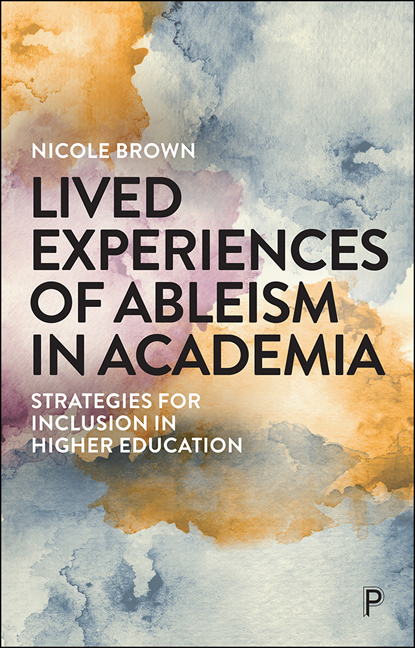13 - “I’ve always wanted to be a nurse …”: challenging academic ableist assumptions
Published online by Cambridge University Press: 18 December 2021
Summary
Introduction
Western capitalist ideology has greatly influenced the emphasis on making graduates ‘corporate-ready’ (Eley, 2010), although it is argued that the point of education is for individuals to identify the dominant work-based ideology and resist becoming indoctrinated (Brookfield and Holst, 2010). Despite this, higher education organisations have embraced the corporate message readily, with an almost anxious emphasis on work-based learning. A university education is no longer limited to the acquisition of knowledge, assisting intellectual enquiry and the attainment of critical thinking skills; even in the context of neoliberal educational opportunity, everyone must graduate ready to enter a professional workforce (Olssen and Peters, 2005).
University provides opportunity for individuals to develop, grow and realise ambition. Organisations such as these pride themselves on equality. All those who have reached ‘the standard’ are welcome, regardless of gender, age, social class, race or disability. This has been created from a neoliberalist political agenda of equity (Davies and Bansel, 2007). Individuals from any part of society should be able to access the transformational power of education, increasing social mobility and economic status (Dearing, 1997). For undergraduates identified as autistic, policy dictates that there is no discrimination against your disability. For many, university life offers an opportunity to immerse themselves in an area of expertise and reconsider themselves after what is likely to have been a stressful and difficult journey through compulsory education (Petrina et al, 2017).
This chapter challenges all higher education organisations to examine their selection, recruitment and crucially, support, of students identified as autistic undertaking a professional degree. A direct example will be demonstrated using the pathway for student nurses undertaking graduate study who are identified as autistic.
Perceptions of autism in academia
Traditional undergraduate education can lend itself to a narrative of self-management and self-directed study. Students have relative freedom in attendance and how they approach their particular chosen area of study. Students wanting to undertake a professional degree leading to a formal professional qualification experience a very different journey. Although recruitment policy does not actively discriminate against them, the odds are already stacked. Potential students will undergo a value-based recruitment process (Cavendish, 2013, Department of Health, 2015) that is latent with ableist assumptions on what meaningful communication looks like and which personal attributes are required to become a successful professional.
- Type
- Chapter
- Information
- Lived Experiences of Ableism in AcademiaStrategies for Inclusion in Higher Education, pp. 217 - 236Publisher: Bristol University PressPrint publication year: 2021



